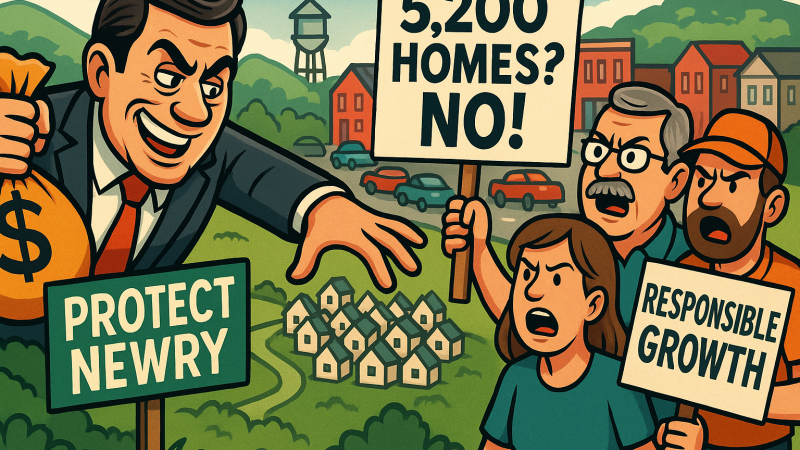“Oconee vs. the Machine: Clemson Power, Haley & a 5,200-Home Showdown
Oconee vs. the Machine: Clemson Power, Corporate Profit, and a 5,200-Home Fight the Upstate Didn’t Ask For
By Joey Hudson | Just the Truth Podcast
Oconee County drew a line in the red clay—and the political class didn’t like it.
County council chairman Matthew Durham says a politically connected developer tried to bully the Upstate into approving a 5,200-home mega-project near the historic Newry Mill along Old Clemson Highway. When council refused a carve-out from Ordinance 2024-18 (which limits density and lot size), the developer fired back with a threat: ignore the ordinance—or face annexation moves, lawsuits, and a “robust media campaign.”
Durham’s reply? Follow the law or don’t build. “Maybe threats work against politicians in Pittsburgh and Charlotte,” Durham wrote on September 22. “But they won’t work here.”
Listen to the segment here:
What’s really going on
Peel back the layers and this isn’t just one developer with an aggressive sales pitch. It’s a Clemson University growth problem—driven by political power and corporate profit, according to Durham.
-
The company at the center, East Shore South LLC, lists the same Chapin, SC address as United Homes Group (UHG), formerly Great Southern Homes.
-
James P. Clements, Clemson’s president, sits on UHG’s board.
-
Nikki Haley—former governor, recent presidential candidate, and now a lifetime Clemson trustee—also sits on that board and, per disclosures, holds hundreds of thousands of dollars in UHG stock.
-
UHG chairman Michael Nieri is a major Clemson donor whose name labels multiple university buildings and facilities.
Durham’s point: the university’s leadership, top donors, and the company behind the Newry play are intertwined. That’s not a crime—but when the same network shaping Clemson’s expansion also benefits from surrounding land deals, taxpayers deserve sunlight and straight answers.
The plans nobody in Oconee saw
After Durham went public, private citizens uncovered “Nettles–Newry Master Plan” renderings on the website of Atlanta-based firm Greenberg Farrow. Those plans showed:
-
a Clemson satellite campus,
-
intramural fields, and
-
even athletic space labeled for the City of Seneca.
Oconee officials say none of this was disclosed to county council. When vice chair Don Mize checked with Seneca, the city said it had zero communication with the developer and hadn’t seen the plans. That discovery reinforced what locals suspected: a Clemson-driven expansion cloaked as “housing.”
The letter and the line in the sand
Developer Mark Hart (formerly the Panthers’ executive who led the failed Rock Hill HQ/practice facility project) sent a September 15, 2025 letter to county administrator Amanda Brock saying his company “does not feel compelled to recognize Ordinance 2024-18 or unreasonable density restrictions.” He floated annexation, lawsuits, “other legal and political responses,” and media pressure if the county didn’t move quickly.
Oconee’s answer was the same for insiders and out-of-towners alike: play by the rules. Local home-grown builders do—and they don’t get special exemptions.
Follow the money, follow the dirt
Records show the 609-acre tract sold for $12.2 million in April 2024—from West Clemson LLC to East Shore South LLC—the firm operating from UHG’s address. The timing lines up with the Nettles–Newry marketing materials. Meanwhile, Clemson’s enrollment keeps climbing, traffic is choking, and the city is out of room. The overflow—and the cost—pushes into Oconee: roads, EMS, utilities, schools. That’s where politically wired development can start to look less like growth and more like cost-shifting to taxpayers.
Why this matters for Upstate families
-
Rule of law vs. special deals: If a developer can “politically respond” its way around local ordinances, your zoning book is a suggestion, not a safeguard.
-
Infrastructure reality: Five thousand new homes without credible traffic, water/sewer, and public safety plans is not growth—it’s gridlock.
-
Public mission vs. private profit: When trustees, donors, and corporate boards overlap, citizens are right to ask who benefits—and who pays.
Where it stands
Council rejected the 5,200-home plan. Durham says the county won’t revisit anything unless the developer fully complies with existing ordinances. His closer: “Oconee County is not for sale. Growth is welcome—responsible, lawful, and on our terms.”
Whether this stops in Newry—or triggers a broader reckoning over Clemson’s donor-driven, board-blessed expansion model—remains to be seen. But for now, the Upstate sent a message: bully politics stops at the county line.





Leave a Reply
Want to join the discussion?Feel free to contribute!